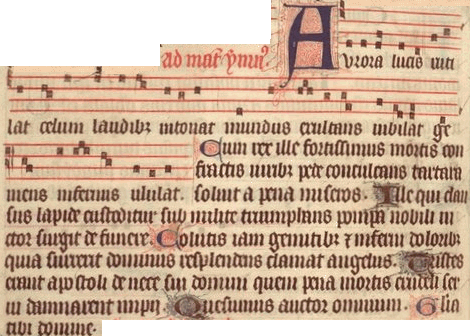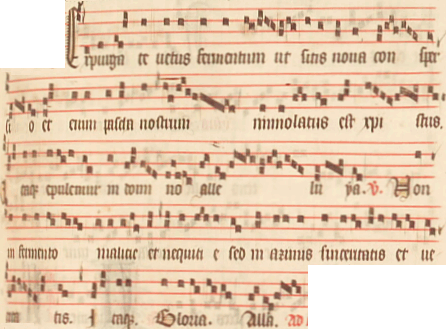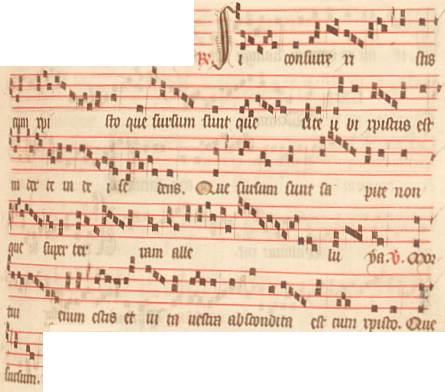Even Years: Origen, Exhortation to martyrdom, 41-42 (PG 11, 618-619)
| Εἰ
μεταβεβήκαμεν
ἐκ τοῦ θανάτου
εἰς τὴν ζωὴν διὰ
τοῦ μεταβεβηκέναι
ἀπὸ ἀπιστίας εἰς
πίστιν, μὴ θαυμάζωμεν,
εἰ μισεῖ ἡμᾶς ὁ
κόσμος. οὐδεὶς
γὰρ μὴ μεταβὰς ἐκ
τοῦ θανάτου εἰς
τὴν ζωὴν ἀλλὰ
μένων ἐν τῷ θανάτῳ
δύναται ἀγαπᾶν
τοὺς
μεταβεβηκότας
ἀπὸ σκοτεινῆς
τῆς τοῦ θανάτου,
ἵν' οὕτως ὀνομάσω,
οἰκίας ἐπὶ τὰ
πεπληρωμένα οἰκοδομήματα
ἐκ λίθων ζώντων
φωτὸς ζωῆς.
| If passing from unbelief to faith means that we have passed from death to life, we should not be surprised to find that the world hates us. Anyone who has not passed from death to life is incapable of loving those who have departed from death's dark dwelling place to enter a dwelling made of living stones and filled with the light of life.
| | ὑπὲρ ἡμῶν
ἔθηκεν Ἰησοῦς
τὴν ψυχὴν, καὶ ἡμεῖς
οὖν θῶμεν αὐτὴν,
οὐκ ἐρῶ ὑπὲρ αὐτοῦ
ἀλλ' ὑπὲρ ἑαυτῶν,
οἶμαι δ' ὅτι κἂν
ὑπὲρ τῶν ἐν τῷ
μαρτυρίῳ ἡμῶν
οἰκοδομηθησομένων.
| Jesus laid down his life for us; so we too should lay down our lives, I will not say for him, but for ourselves and also, surely, for those who will be helped by the example of our martyrdom.
| | ἐνέστη
ἡμῖν καιρὸς
Χριστιανοῖς
καυχήσεων· οὐ
μόνον, γάρ
φησιν, ἀλλὰ καὶ
καυχώμενοι ἐν
ταῖς θλίψεσιν,
εἰδότες ὅτι ἡ
θλῖψις ὑπομονὴν
κατεργάζεται, ἡ
δὲ ὑπομονὴ
δοκιμὴν, ἡ δὲ
δοκιμὴ ἐλπίδα·
ἡ δὲ ἐλπὶς οὐ
καταισχύνει, μόνον
ἡ ἀγάπη τοῦ
θεοῦ ἐκκεχύσθω
ἐν ταῖς καρδίαις
ἡμῶν διὰ πνεύματος
ἁγίου...
| Now is the time for Christians to rejoice. Scripture says: We should rejoice in our sufferings, because we know that suffering trains us to endure with patience, patient endurance makes us pleasing to God, and being pleasing to God gives us ground for a hope that will not be disappointed. Only let the love of God be poured forth in our hearts through the Holy Spirit.
| | Εἰ
καθὼς περισσεύει
τὰ παθήματα τοῦ
Χριστοῦ, οὕτω
διὰ τοῦ Χριστοῦ
περισσεύει καὶ
ἡ παράκλησις,
προθυμότατα
παραδεξώμεθα
τὰ Χριστοῦ παθήματα,
καὶ περισσευσάτω
ἐν ἡμῖν, εἴπερ ὀρεγόμεθα
περισσῆς
παρακλήσεως, ἣν
πάντες μὲν οἱ
πενθοῦντες
παρακληθήσονται,
τάχα δὲ οὐκ ἐπ' ἴσης.
εἰ γὰρ ἐπ' ἴσης ἦν
ἡ παράκλησις, οὐκ
ἂν ἐγέγραπτο τό·
καθὼς περισσεύει
τὰ παθήματα τοῦ
Χριστοῦ εἰς ἡμᾶς,
οὕτω περισσεύει
καὶ ἡ παράκλησις
ἡμῶν.
| The more we share in the sufferings of Christ, the more we share, through him, in his consolation. We should be extremely eager to share in Christ's sufferings and to let them be multiplied in us if we desire the superabundant consolation that will be given to those who mourn. This consolation will not perhaps be the same for all, for if it were, Scripture would not say: "The more we share in the sufferings of Christ, the more we share in his consolation" (2 Cor 1:5).
| | οἱ
κοινωνοὶ τῶν
παθημάτων κατὰ
τὴν ἀναλογίαν
τῶν παθημάτων, ὧν
εἰσι κοινωνοὶ
πρὸς Χριστὸν,
κοινωνοὶ ἔσονται
καὶ τῆς παρακλήσεως·
ἃ καὶ μανθάνετε
ἀπὸ τοῦ
πεπιστευμένως
τὰ τοιαῦτα λέγοντος·
οἴδαμεν γὰρ, ὡς
κοινωνοί ἐστε
τῶν παθημάτων,
οὕτως καὶ τῆς
παρακλήσεως.
| Sharing in his consolation will be proportionate to our sharing in his sufferings. You learned that from the authoritative words of Paul: "You share the encouragement we receive, no less than the sufferings we bear" (2 Cor 1:6).
| | φησὶ δὲ
διὰ προφήτου ὁ
θεός· καιρῷ
δεκτῷ ἐπήκουσά
σου καὶ ἐν ἡμέρᾳ
σωτηρίας ἐβοήθησά
σοι. ποῖος οὖν ἄλλος
εὐπρόσδεκτος
καιρὸς, ἢ ὅτε διὰ
τὴν εἰς θεὸν ἐν
Χριστῷ εὐσέβειαν
ὑπὸ φρουρὰν
πομπεύοντες ἐν
τῷ κόσμῳ καὶ
θριαμβεύοντες
μᾶλλον ἤπερ
θριαμβευόμενοι
ἀπαγόμεθα;
| God says through the prophet: At an acceptable time I heard you, on the day of salvation I helped you. What time could be more acceptable than when, for our fidelity to God in Christ, we are made a public spectacle and led away under guard, not defeated but triumphant?
| | οἱ γὰρ
ἐν Χριστῷ μάρτυρες
συναπεκδύονται
αὐτῷ τὰς ἀρχὰς
καὶ τὰς ἐξουσίας
καὶ
συνθριαμβεύουσιν
ὡς κοινωνοὶ τῶν
παθημάτων αὐτοῦ
γινόμενοι οὕτως
καὶ τῶν ἐν τοῖς
παθήμασιν αὐτοῦ
ἀνδραγαθημάτων·
ἐξ ὧν ἐστι καὶ
τὸ θριαμβεῦσαι
τὰς ἀρχὰς καὶ
τὰς ἐξουσίας, ἃς
μετ' ὀλίγον ὄψεσθε
νενικημένας
καὶ κατῃσχυμμένας.
| In Christ and with Christ the martyrs disarm the principalities and powers and share in his triumph over them, for their share in Christ's sufferings makes them sharers also in the mighty deeds those sufferings accomplished.
| | ποία ἄλλη
οὕτως ἡμέρα
σωτηρίας ὡς ἡ ἡμέρα
τῆς τοιαύτης ἡμῶν
ἐντεῦθεν ἀπαλλαγῆς;
| What could more appropriately be called the day of salvation than the day of such a glorious departure from this world?
| | ἀλλὰ
παρακαλῶ·
μηδεμίαν ἐν
μηδενὶ δῶτε
προσκοπὴν, ἵνα
μὴ μωμηθῇ ὑπὸ ὑμῶν
τὸ πρεσβυτέριον
ἢ ἡ διακονία, ἀλλὰ
ἐν παντὶ ἑαυτοὺς
συστήσασθε ὡς
θεοῦ διάκονοι, ἐν
ὑπομονῇ πολλῇ
λέγοντες· καὶ
νῦν τίς ἡ ὑπομονή
μου; οὐχὶ ὁ κύριος;
| But, I urge, "Avoid putting obstacles in anyone's way, so that no blame may attach to our work of service; but in everything prove yourselves authentic servants of God, by resolute perseverance," saying "So now, Lord, what am I to hope for? My hope is in you" (Ps 39:7).
|
Odd Years: Vatican II, Constitution on the Sacred Liturgy, 5-6
| Deus, qui "omnes homines vult salvos fieri et ad agnitionem veritatis venire, "multifariam multisque modis olim loquens patribus in prophetis (Hebr. 1,1), ubi venit plenitudo temporis, misit Filium suum, Verbum carnem factum, Spiritu Sancto unctum, ad evangelizandum pauperibus, ad sanandos contritos corde, Mediatorem Dei et hominum. Ipsius namque humanitas, in unitate personae Verbi, fuit instrumentum nostrae salutis. Quare in Christo "nostrae reconciliationis processit perfecta placatio, et divini cultus nobis est indita plenitudo.
| God who "wills that all men be saved and come to the knowledge of the truth" (1 Tim. 2:4), "who in many and various ways spoke in times past to the fathers by the prophets" (Heb. 1:1), when the fullness of time had come sent His Son, the Word made flesh, anointed by the Holy Spirit, to preach the the gospel to the poor, to heal the contrite of heart, to be a "bodily and spiritual medicine", the Mediator between God and man. For His humanity, united with the person of the Word, was the instrument of our salvation. Therefore in Christ "the perfect achievement of our reconciliation came forth, and the fullness of divine worship was given to us".
| | Hoc autem humanae Redemptionis et perfectae Dei glorificationis opus, cui divina magnalia in populo Veteris Testamenti praeluserant, adimplevit Christus Dominus, praecipue per suae beatae Passionis, ab inferis Resurrectionis et gloriosae Ascensionis paschale mysterium, quo "mortem nostram moriendo destruxit, et vitam resurgendo reparavit. Nam de latere Christi in cruce dormientis ortum est totius Ecclesiae mirabile sacramentum.
| The wonderful works of God among the people of the Old Testament were but a prelude to the work of Christ the Lord in redeeming mankind and giving perfect glory to God. He achieved His task principally by the paschal mystery of His blessed passions resurrection from the dead, and the glorious ascension, whereby "dying, he destroyed our death and, rising, he restored our life". For it was from the side of Christ as He slept the sleep of death upon the cross that there came forth "the wondrous sacrament of the whole Church".
| | Ideoque, sicut Christus missus est a Patre, ita et ipse Apostolos, repletos Spiritu Sancto, misit, non solum ut, praedicantes Evangelium omni creaturae, annuntiarent Filium Dei morte sua et resurrectione nos a potestate satanae et a morte liberasse et in regnum Patris transtulisse, sed etiam ut, quod annuntiabant, opus salutis per Sacrificium et Sacramenta, circa quae tota vita liturgica vertit, exercerent.
| Just as Christ was sent by the Father, so also He sent the apostles, filled with the Holy Spirit. This He did that, by preaching the gospel to every creature, they might proclaim that the Son of God, by His death and resurrection, had freed us from the power of Satan and from death, and brought us into the kingdom of His Father. His purpose also was that they might accomplish the work of salvation which they had proclaimed, by means of sacrifice and sacraments, around which the entire liturgical life revolves.
| | Sic per Baptismum homines paschali Christi mysterio inseruntur: commortui, consepulti, conresuscitati; spiritum accipiunt adoptionis filiorum, "in quo clamamus: Abba, Pater" (Rom. 8,15), et ita fiunt veri adoratores, quos Pater quaerit.
| Thus by baptism men are plunged into the paschal mystery of Christ: they die with Him, are buried with Him, and rise with Him; they receive the spirit of adoption as sons "in which we cry: Abba, Father" (Rom. 8 :15), and thus become true adorers whom the Father seeks.
| | Similiter quotiescumque dominicam cenam manducant, mortem Domini annuntiant donec veniat. Idcirco, ipso die Pentecostes, quo Ecclesia mundo apparuit,"qui receperunt sermonem" Petri "baptizati sunt. Et erant "perseverantes in doctrina Apostolorum et communicatione fractionis panis et orationibus... collaudantes Deum et habentes gratiam ad omnem plebem.
| In like manner, as often as they eat the supper of the Lord they proclaim the death of the Lord until He comes. For that reason, on the very day of Pentecost, when the Church appeared before the world, "those who received the word" of Peter "were baptized." And "they continued steadfastly in the teaching of the apostles and in the communion of the breaking of bread and in prayers... praising God and being in favor with all the people" (Acts 2:41-47).
| | Numquam exinde omisit Ecclesia quin in unum conveniret ad paschale mysterium celebrandum: legendo ea "in omnibus Scripturis quae de ipso erant", Eucharistiam celebrando in qua "mortis eius victoria et triumphus repraesentatur", et simul gratias agendo "Deo super inenarrabili dono" (2 Cor. 9,15) in Christo Iesu, "in laudem gloriae eius (Eph. 1,12), per virtutem Spiritus Sancti.
| From that time onwards the Church has never failed to come together to celebrate the paschal mystery: reading those things "which were in all the scriptures concerning him" (Luke 24:27), celebrating the eucharist in which "the victory and triumph of his death are again made present" (19), and at the same time giving thanks "to God for his unspeakable gift" (2 Cor. 9:15) in Christ Jesus, "in praise of his glory" (Eph. 1:12), through the power of the Holy Spirit.
|
| |




